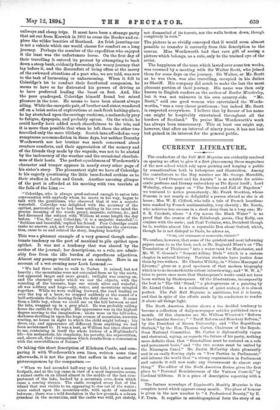CURRENT LITERATURE.
The conductors of the Pall Mall Magazine are evidently resolved on sparing no effort to give it a first place among those magazines of the new school which rely upon gaining and keeping a public by sensationalism both in letterpress and illustration. Among the contributors to the May number are Mr. George Meredith, whose "Lord Ormont and his Aminta " is as notable for aristo- cratic perfume and literary embroidery as The Egoist itself ; Lord Wolseley, whose paper on "The Decline and Fall of Napoleon' we ventured to notice prematurely; Mr. Frank Stockton, whose Pomona is not nearly so delightful a person abroad as she is at home ; Mrs. W. K. Clifford, who tells a tale of French heartless- ness masked by French sentimentality, very cleverly ; Mr. Norris, who achieves less success in a short story than in a long one; Mr S. R. Crockett, whose "A Cry across the Black Water" is no proof that the creator of the Edinburgh gamin, Cleg Kelly, can conjure with the eerie ; and Paul Verlaine, who, Decadent though he is, warbles almost like a reputable Don about Oxford, which, though he is not disloyal to Paris, he adores as, "0 toi, cite charmants et memorable, Oxford!"
We confess, however, that some of the quietest and most informing papers seem to us the best, such as Mr. Reginald Blunt's on "The Translation of Thirlmere " into a water-tank for Manchester, and Mr. W. T. Greene's "Serpent-killing Birds" which is a curious chapter in natural history. Parisian students have justice done them by two writers. Mr. Charles Willeby, in" Pietro Mascagni of Livorno," gives us a good specimen of that modern biography which is to no inconsiderable extent interviewing; and "W. W. A." tries to prove once more that Shakespeare's works could not have been written by Shakespeare. Of the illustrations, incomparably the best is "The Old Strad,' " a photogravure of a painting by Mr. Lionel Cohen. As a realisation of quiet ecstacy, it is almost perfect. The Pall Mall Magazine is ambitious, but it is heavy, and that in spite of the efforts made by its conductors to render it above all things light.


































 Previous page
Previous page